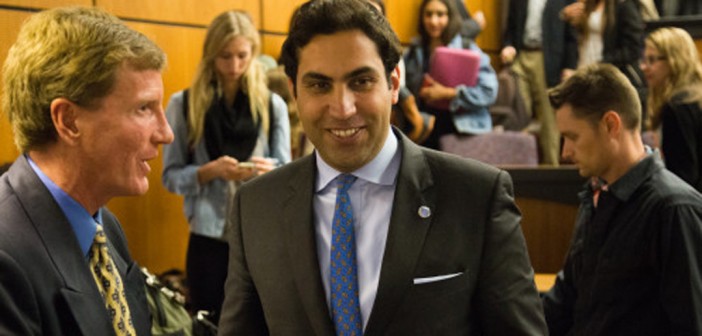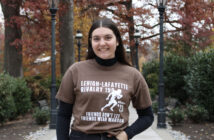In honor of Lehigh’s 10th anniversary as an accredited United Nations non-governmental organization, Ahmad Alhendawi, UN secretary general’s envoy on youth, visited Lehigh on Nov. 12 to gave a lecture in Sinclair auditorium.
On Aug. 23, 2004, Lehigh became the sixth university in the world to ever attain NGO status at the UN.
Alhendawi came to deliver advice on young people’s growing position in our world, fueled by his passion for youth advocacy. His message was that youths need to use their passions to contribute to the global community.
Our global situation is complex, he said. Today, half of the work population are under 25 years of age. Young people across the globe come in at an astounding 1.8 billion.
“This is the largest generation of young people in history,” Alhendawi said.
Though youth are often a gift to a nation, he said, 90 percent of young people are in developing countries. The African continent is set to become home to the youngest population in history.
“We must evolve to keep up with the shifting demographics,” Alhendawi said.
Seventy-five million young people are unemployed. This unemployment is defined as even those not receiving educations or technical training. Essentially, 75 million young people are without a job, education or technical skills. To counter this, 700 million jobs will need to be created to have no unemployment in this world. Alhendawi challenged Lehigh students to ask themselves, “will we help create these 700 million jobs?”
Furthermore, Alhendawi warned students that degrees have an expiration date. He said he is aware of the extreme ire that stirs in students, but that youth are in abundance. Additionally, technology and jobs are constantly changing. Alhendawi urged Lehigh students to have an advantage in preparing to continue their educations throughout their careers.
“The least you could get from a university is a degree,” Alhendawi said. “A degree is nothing much at all — even if you get it with a 3.99 (GPA). What you should think of today is how you are going to use these years at the university.”
Alhendawi said students should take full advantage of the many resources and opportunities available to them. For example, Lehigh offers a program that brings youth to work with non-governmental organizations through the Youth Representative program. He said students who build their own experiences outside of their course load will differentiate them from other students.
“I think (students) should continue to be global citizens and to think of themselves as citizens of the world where they have to care about the global issues, the global challenges,” said Alhendawi. “They have to use years here at university also to volunteer, to give to their communities as much as they give the knowledge of (certificate and degree.) You have to also think of gaining and contributing to the development of communities and to develop those skills….So that they can contribute to development at large.
“I think that a very important rule for young people was always to follow their passion and to have passion and compassion to contribute to development.”
Zoe Shpiner, ’17, said, she believes bringing high-ranking members of the UN to Lehigh exposes students to current events that they otherwise may not have learned about.
“I think it’s important that Lehigh bring in officials from the United Nations because they offer a globalized perspective that is based on real world issues instead of just what we receive from a classroom setting,” said Jordan Smith, ’15. “They also help inspire students to get involved by promoting the unique partnership Lehigh has with the United Nations.”






Comment policy
Comments posted to The Brown and White website are reviewed by a moderator before being approved. Incendiary speech or harassing language, including comments targeted at individuals, may be deemed unacceptable and not published. Spam and other soliciting will also be declined.
The Brown and White also reserves the right to not publish entirely anonymous comments.